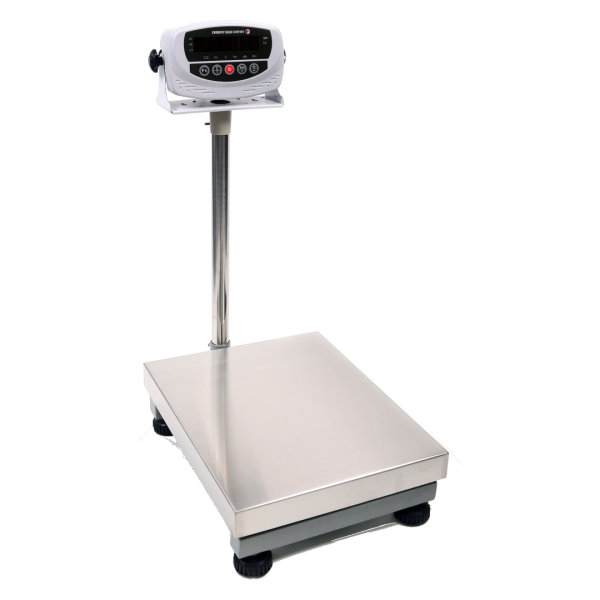How Industrial Scales Work: A Comprehensive Summary for New Users
Comprehending the auto mechanics behind commercial ranges is critical for new customers that intend to guarantee precision in their measurements. These gadgets depend on tons cells and pressure gauge technology to convert weight right into a measurable layout, yet the subtleties of their procedure prolong beyond plain capability. From the different kinds offered to the important techniques for correct use and upkeep, each element plays a significant function in accomplishing reliable outcomes. As we explore these components, one must take into consideration just how these aspects communicate to boost performance in varied industrial applications.
Basics of Industrial Scales
Industrial ranges are necessary tools used throughout various markets, consisting of production, logistics, and farming, to guarantee exact weight dimensions of heavy lots. The fundamental concept behind commercial ranges entails the conversion of weight right into a measurable kind that can be displayed digitally or analogically. These scales utilize various mechanisms, such as lots cells or mechanical bars, to figure out the weight of things positioned upon them.

In enhancement to their dimension capacities, industrial scales are designed to withstand rough settings, including robust construction that stands up to dust, moisture, and heavy influences. Calibration and upkeep are important to make certain precision, as even small disparities can cause substantial economic ramifications. By comprehending the essentials of industrial scales, customers can value their value in different industrial applications.
Types of Industrial Scales
Various types of commercial ranges provide to the diverse needs of different sectors, each developed to manage particular weighing jobs with accuracy and reliability. Among one of the most typical types are floor scales, which are suitable for weighing cumbersome and heavy products. These ranges generally include large systems and can fit palletized items, making them important in storage facilities and delivery facilities.
Another kind is bench ranges, which are frequently made use of for smaller items in manufacturing and retail settings. They offer precise measurements for items that need precision, such as chemicals or parts in setting up lines (Industrial Scales). For mobile procedures, portable scales offer flexibility and ease of transport, appropriate for fieldwork or temporary setups
Furthermore, specialized ranges like checkweighers are used in production lines to preserve top quality control by ensuring that products meet weight specs. Each kind of commercial scale plays a vital duty in improving functional performance and accuracy throughout different fields.
Exactly How Weighing Mechanisms Job
Weighing systems are important elements that enable exact measurement of mass throughout various industrial scales. These systems make use of various concepts of physics and design to give precise weight readings, necessary for inventory administration, quality assurance, and conformity with governing standards.
One common type of evaluating system is the load cell, which runs on the concept of pressure evaluates. When a lots is applied, the load cell warps somewhat, generating an electric signal symmetrical to the weight. This signal is then transformed right into a readable weight dimension by the range's electronics.
An additional commonly made use of system is the mechanical balance, which utilizes a system of bars and weights. Industrial Scales. This technique relies upon the concept of equilibrium, where the weight he said of the things being gauged is balanced versus recognized weights, permitting direct dimension
Furthermore, hydraulic and pneumatic scales take advantage of liquid characteristics concepts to measure weight. These systems make use of the stress put in by a lots to determine weight, providing high precision for massive tons.
Correct Usage Techniques
When utilizing industrial ranges, adhering to appropriate usage techniques is vital for preserving and guaranteeing precise measurements equipment honesty. It is important to select the proper scale for your specific application, as scales vary in capacity and precision.
Before weighing, ensure that the scale is positioned on a steady, degree surface without disturbances or resonances. This will certainly help to minimize mistakes caused by exterior elements. In addition, calibrate the scale according to the supplier's specifications before make use of, guaranteeing that it is operating correctly.
When placing items on the scale, disperse the weight evenly to stay clear of tipping or damaging the devices. Constantly permit the range to stabilize before tape-recording the weight, as fluctuations might happen during preliminary positioning. For bulk products, make use of containers that are ideal for the range size to avoid overloading.
In addition, stay clear of placing cold or overly hot products directly on the scale, as temperature level variants can impact accuracy. Lastly, maintain the considering platform tidy and cost-free of particles to protect against contamination and guarantee reliable results. By complying with these strategies, users can make the most of the performance and longevity of their industrial scales.
Maintenance and Calibration Tips
Making sure the long life and precision of commercial ranges needs thorough maintenance and routine calibration. A preventative maintenance timetable is crucial; it must consist of regular assessments to identify damage, particularly on lots cells and various other sensitive parts. Frequently cleaning the scale's surface area and guaranteeing the bordering location is without particles will assist keep its integrity and performance.
Calibration is equally necessary and should be executed at routine intervals or whenever the range experiences substantial modifications in temperature, moisture, or physical displacement. Make use of licensed calibration weights that are traceable to nationwide criteria for precision. link Paper each calibration session meticulously to track performance over time and recognize any kind of trends or recurring concerns.
Furthermore, be mindful of the scale's atmosphere. Prevent placing it near sources of resonance, electromagnetic interference, or extreme temperatures, as these factors can detrimentally influence measurements. Ultimately, train all operators on appropriate scale use and upkeep procedures to ensure regular efficiency and precision. By sticking to these maintenance and calibration pointers, users can boost the integrity of their industrial scales, making certain optimum procedure in any type of setup.
Verdict

Understanding the technicians behind industrial ranges is crucial for brand-new customers who desire to make certain accuracy in their measurements.Industrial scales are vital tools made use of throughout various sectors, including manufacturing, logistics, and farming, to ensure exact weight dimensions of heavy lots. The essential principle behind commercial scales includes the conversion of weight right into a quantifiable type that can be shown digitally or analogically. By understanding the essentials of industrial ranges, individuals can value their significance in numerous industrial applications.
In final thought, understanding the procedure and upkeep of industrial ranges is crucial for guaranteeing precise weight measurements in different applications. (Industrial Scales)